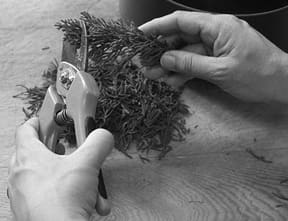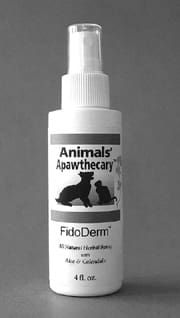IRRITATED SKIN RELIEF FOR DOGS: OVERVIEW
1. For fast, temporary relief of itchy skin that exhibits no change of appearance, liberally apply loose, soupy oatmeal or a cooled tea made with peppermint and/or lavender.
2. When itching is associated with minor redness, use a rinse made with herbs that speed healing and fight bacteria, such as chamomile, plantain, and/or calendula.
3. If your dog has open sores or scratches, use a rinse combining calendula and comfrey with sage, bee balm, thyme, and/or yarrow, to accelerate healing without harming beneficial microbes on the skin.
Winston, a four-year-old yellow Lab, is very happy. He got to go hiking with his human. But he is also itchy, and now he is chewing at little inflamed bumps on his chest and hind legs. Busting through underbrush in search of the ever-elusive cottontail, Winston picked up a few ticks. Luckily, his human always carries a fine-toothed flea comb when she walks in brush country with him, and she was able to remove the nasty blood suckers before they could dig in. Nevertheless, the ticks did get some bites in, leaving red, itchy, oozing bumps that may get infected if not treated.

Katie Bell, a 10-year-old Schnauzer, has different problems. She is itchy all the time, especially on her tummy and the insides of her haunches. Her skin there is pink, hot to the touch, and sometimes looks cruddy, even though she is as clean as a rambunctious little dog can be.
Katie Bell’s people know that her chronic condition is likely due to deeper problems – perhaps with diet, allergy, or autoimmune dysfunction. They are working toward finding a lasting resolution to Katie Bell’s distress, but need to find symptomatic relief for her in the meantime. And they wish to avoid, at all cost, the risky option of corticosteroid drugs.
If you live in the world of dogs, chances are you will be confronted some day with a dog suffering from some sort itchy-chewy skin ailment. Fleas, ticks, sunburn, mites, cuts, mosquitoes, cat scratches (those are especially fun to get), thorns, poison ivy, and especially allergies are bound to wreak havoc at some time or another, and you should be prepared for it.
Although most chronic skin problems like Katie Bell’s are secondary to deeper issues, such as food or flea allergies or perhaps sensitivity to exogenous chemicals in the environment, most skin problems can be temporarily relieved with proper use of topical remedies. And you probably don’t need to travel far to find one. Soothing, healing relief can be as close as the kitchen spice cabinet if your companion is bothered by an acute irritation, such as a “told you so” bite inflicted by the dog-harassed, queen feline of the house (my dog Willow insists it’s worth it).
Topical Home Remedies for Dogs’ Itchy Skin
One of the quickest ways to reduce inflammation of the skin and itchiness is by use of herbal astringents.
Astringents work their magic by quickly tightening skin and subcutaneous tissue, and thereby reducing inflammation and redness. A classic example of such an astringent is witch hazel extract, which can be purchased in a clear liquid, distilled form at any drugstore. A dab or two of witch hazel applied by cotton ball can bring instant relief to angry flea or mosquito bites.
It is important to know that most commercial witch hazel extracts are made with isopropyl alcohol, a substance that is toxic if ingested in large enough amounts. This type of witch hazel should be reserved for uses where only a few dabs are needed (i.e., don’t rinse your dog with it). Better yet, look for witch hazel that is made with ethanol (grain alcohol, the type contained in consumable liquors) or vegetable glycerin, an edible coconut oil derivative that is used in natural soaps and cosmetics for its emollient, skin-soothing qualities.
Several choices of natural topical remedies are available at the pet supply store, too. For hot spots, irritations caused from a bandage or a rubbing collar, sunburned ears, or insect bites that are limited to just a few points on the body, you might try a spritz or two of Animal Apawthecary’s FidoDerm Herbal Spray at the affected areas. FidoDerm contains aloe vera and calendula to help promote healing, along with a nontoxic assortment of antibacterial and antifungal essential oils.
Alternatively, you might wish to go the homeopathic route, with a few drops of Animal Aid (available from Biomedrix, Inc.), which is a combination of 11 different homeopathic remedies plus aloe vera. Or you could try P15 Skin Relief by Newton Laboratories, Inc., which combines a dozen homeopathic remedies into a base of 15 percent alcohol.
Do these “shotgun approach” homeopathic combinations work? For an answer to that question I talked with Terri Grow, CEO and founder of PetSage, Inc., a retail catalog company that stocks hundreds of natural pet care products and offers classes on how to properly use them.
“My customers report that the Newton (P15 Skin Relief) product works especially well for chronic, itchy patches,” says Grow, “especially when given internally and applied externally simultaneously.” She says that the aforementioned Animal Aid product works better to speed healing of more acute issues, such as flea and insect bites. This makes sense to me as an herbalist; the formula is based with aloe vera, a time-proven healing agent.
All-Over Itchiness

If your dog’s itching is body-wide and nonspecific, you may need to consider a full body rinse, or a natural anti-itch shampoo. Keep in mind, however, that there are no stand-alone “cure-alls” out there, and most topical products are designed to address specific conditions.
For instance, “skin and coat” products that are based with aloe vera may work great for healing wet, runny sores and oozing bites, but may be too drying for dogs with dry, flaky skin. In those cases, you are better off with products that contain vegetable oils, collagen, and herbs that promote skin healing without stripping natural body oils from the hair follicles.
One choice is AvoDerm Collagen Spray from Breeder’s Choice. This product contains avocado oil and collagen P-10, both of which are known for their skin-conditioning properties. Unfortunately, as with many pet care products, the other ingredients of the formula are not listed on the label; word on the street, however, is that this product works pretty well.
A good shampoo can bring relief, too, but keep in mind that “squeaky-clean” may not be what your dog needs. One of the biggest problems associated with frequent bathing is that many dog shampoos do their job too efficiently, cleansing the skin and coat of the waxy oils that are needed to maintain supple, healthy skin.
Of course, as I mentioned before, you may not need to buy commercial products at all. The remedy you need might already be in your home kitchen or garden. The following are a few of my favorite home brewed topical remedies. For dogs with itchy skin that exhibits little or no change of appearance (it just itches!), try a liberal application of oatmeal. Yep, the stuff we eat for breakfast. Cook it into a loose, soup-like consistency, allow it to cool, take it and your companion outside, and drench him with it. Allow it to remain in his coat as long as possible, before rinsing or brushing out the residue.
Another option is to make a peppermint and/or lavender skin rinse. Alternately, rosemary can be used as well. Buy some bulk lavender herb or peppermint leaf (or combine both) at the health food store. Pack a large tea ball full of the herb, and steep it in a quart or two of near-boiling water until it cools. Then drench the pooch with the liquid. It will help his itching, and he will smell nice, too!
When itching is associated with minor redness, I use rinses that incorporate herbs with vulnerary (speed healing) and bacteria-fighting qualities. Daily skin rinses made of chamomile, plantain, or calendula (individually or combined) are all worthwhile choices. Again, completely soak the dog with the tea, and allow him to drip-dry.
If open scratches, scabs, or sores are visible, combine calendula and comfrey with sage, bee balm, thyme, and/or yarrow tea in equal proportions. This will accelerate the healing process and help inhibit bacterial infection without irritating the skin or interfering with the activities of beneficial microbes and ectoparasites – friendly bugs that help keep the skin healthy.
However, if your companion’s skin condition appears severe (the skin is flaky, red, and scratching or chewing is continuous), stronger astringents may be needed. A decoction of uva-ursi leaf, juniper leaf (a common landscape shrub), or rose bark (any variety will do), combined with calendula flowers, should serve well here. Here is one such formula:
Astringent/Healing Skin Rinse
Combine equal parts of the following fresh and/or dried herbs:
- Juniper or uva-ursi leaf
- Calendula flowers
- Peppermint leaf
Combine all of the herbs and place into a glass or stainless pot. Cover with water and bring to a gentle boil over moderate heat. Simmer for 10 minutes, then remove from heat and allow to stand until cooled. Strain the cooled fluid through a sieve. Then soak the dog’s skin and coat and let him drip-dry.
If your companion insists on licking the solution off, you can use the rinse as a fomentation. Wrap an old towel or cloth (preferably dye-free and unbleached) around the affected body parts, and then thoroughly soak the towel with the cooled solution. This prevents your pup from licking the solution off, and enables you to keep the solution on her for several hours.
When to Call the Vet
If an established bacterial infection is evident (swelling is elevated and hot/red, and sores are discharging pus), you need to call your veterinarian. If she happens to be holistic, she might consider the following regimen, which is used to boost immune system response to the infection while adding direct antibacterial intervention:
- Twice-daily internal doses of echinacea tincture, to boost the immune system, along with a twice-daily dose of Oregon grape tincture, to strengthen liver function and the body’s elimination of systemic waste materials and bacterial die-off.
- Twice-daily external applications of echinacea and Oregon grape (or organically farmed goldenseal powder, tincture, salve, or ointment at the sites of infection).
As you see, symptomatic relief for your dog’s itching may be at arm’s reach. Just keep in mind that chronic skin ailments are seldom skin-deep, and treating symptoms such as dry, itchy skin or hot spots with topical remedies alone will not amount to a curative therapy for deeper health issues. Most chronic skin issues are related to allergies, diet, or both. To find a lasting solution for your companion, talk to a holistic veterinarian who is familiar with issues of nutrition, allergies, and natural approaches to skin care.
Greg Tilford is a well-known expert in the field of veterinary herbalism. An international lecturer and teacher of veterinarians and pet owners alike, Greg has written four books on herbs, including All You Ever Wanted to Know About Herbs for Pets (Bowie Press, 1999), which he coauthored with his wife, Mary.







I am so lost with my Charlie
Very informative! I love the info provided by you. This article is very helpful for me. Thank you so much for the great article.
What a great post! I really like the tips you shared. I love your advice and such a helpful post. Thanks for sharing.